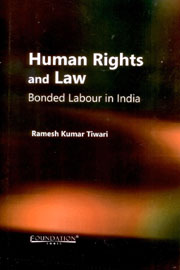Book contents
- Frontmatter
- Contents
- List of Tables
- Foreword
- Preface
- 1 Introduction
- 2 Slavery and Debt Bondage in British India: Policy and Implementation
- 3 Debt Bondage during the Post-Independence Period: Policy Developments
- 4 Problems in the Implementation of Bonded Labour System (Abolition) Act, 1976
- 5 Rehabilitation of Released Bonded Labourers
- 6 Judicial Intervention
- Conclusion
- Appendices
- Glossary
- Biographical Notes
- Bibliographical Essay
- Index
1 - Introduction
Published online by Cambridge University Press: 26 October 2011
- Frontmatter
- Contents
- List of Tables
- Foreword
- Preface
- 1 Introduction
- 2 Slavery and Debt Bondage in British India: Policy and Implementation
- 3 Debt Bondage during the Post-Independence Period: Policy Developments
- 4 Problems in the Implementation of Bonded Labour System (Abolition) Act, 1976
- 5 Rehabilitation of Released Bonded Labourers
- 6 Judicial Intervention
- Conclusion
- Appendices
- Glossary
- Biographical Notes
- Bibliographical Essay
- Index
Summary
International Labour Organization (ILO) and Debt Bondage
In the literature dealing with unfree labour practices, debt bondage has been regarded as one of the forms of forced labour, the others being slavery and serfdom. The ‘UN Supplementary Convention on the Abolition of Slavery, the Slave Trade, and Institutions and Practices Similar to Slavery, 1956’ defined debt bondage as a ‘status or condition arising from a pledge by a debtor of his personal services or of those of a person under his control as security for a debt, if the value of those services as reasonably assessed is not applied towards the liquidation of the debt or the length and nature of those services are not respectively limited and defined’. In the context of the above definition, it has been argued by G.E.M. de Ste. Croix that though the debtor is not a slave, his services and his labour are at the disposal of his creditor. G.E.M. de Ste. Croix has been of the view that debt bondage though technically made illegal still persists in some countries.
The problem of debt bondage has been in the news due to its coverage in international news magazines and the ILO reports. Newsweek in its 4th May 1992 issue carried a special report on the bonded labour system. The Newsweek investigation suggests that cases of involuntary servitude run well into millions. It also emphasized on debt bondage being the most common cause for families to work for generations.
- Type
- Chapter
- Information
- Human Rights and LawBonded Labour in India, pp. 1 - 15Publisher: Foundation BooksPrint publication year: 2011



